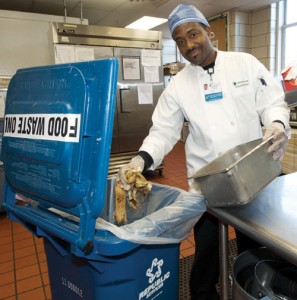It’s nice to see when other hospitals in your area begin composting…I think it’s finally becoming a trend and nearly every healthcare institution is aware of it. From my personal experience, implementing a compost program can be done within any hospital, and with marketing and education can become a real centerpiece example reflecting a hospital’s core values.

Wilmington Hospital serves more than 600 meals each day, according to Mike Wariwanchik, the hospital’s Food & Nutrition supervisor. In the process, twice weekly, Food and Nutrition staff fill eight special receptacles, each holding 96 pounds of leftover food and food byproducts: peels, rinds, coffee grounds, egg shells and table scraps,” Wariwanchik says.
What makes the receptacles special is that the contents are composted (naturally recycled) to transform them into natural fertilizers for local gardens — including several gardens at Christiana Hospital.
A vendor picks up the food scraps, mixes it with matter from other sites, and adds worms and pests to catalyze decomposition. In just a few weeks it becomes natural fertilizer for farms and gardens.
That amounts to:
1,536 pounds of food scraps weekly.
A year’s worth works out to about 40 tons.
That much food scraps will produce more than 16 tons of excellent compost.
Thanks to committed Environmental Services plus Food and Nutrition staff and environmental stewardship at Christiana Care, much less waste is going to landfills and more gardens are nourished with natural fertilizers.
